|
EDT PDV SDK Documentation 6.1.0
|
|
EDT PDV SDK Documentation 6.1.0
|

Functions | |
| int | edt_configure_ring_buffers (EdtDev edt_p, unsigned int bufsize, unsigned int numbufs, unsigned int write_flag) |
| Prepare and configure ring buffers for DMA to/from the EDT device. More... | |
| int | edt_ref_tmstamp (EdtDev edt_p, u_int val) |
Causes application-defined events to show up in the same timeline as driver events when the event history is listed by running setdebug -g. More... | |
| uint_t | edt_get_todo (EdtDev edt_p) |
| Get the number of buffers that the driver has been told to acquire. More... | |
| int | edt_read (EdtDev edt_p, void *buf, uint_t size) |
| Perform a DMA read from the EDT device. More... | |
| int | edt_write (EdtDev edt_p, void *buf, uint_t size) |
| Perform a DMA write to the EDT device. More... | |
| int | edt_configure_block_buffers (EdtDev edt_p, int bufsize, int numbufs, int write_flag, int header_size, int header_before) |
| Prepare and configure ring buffers for DMA, allocating buffers as a single large block, setting the buffer addresses from within that block. More... | |
| void | edt_set_dmy_wait_for_buffers_callback (EdtDev edt_p, void(*callback)(EdtDev edt_p, void *buf)) |
| Register a callback to populate the ring buffer with data when edt_wait_for_buffers() is called. More... | |
| void | edt_set_dmy_reg_read_callback (EdtDev edt_p, uint32_t(*callback)(EdtDev edt_p, uint32_t reg_desc)) |
| Register a callback to read a simulated register when edt_reg_read() is called. More... | |
| void | edt_set_dmy_reg_write_callback (EdtDev edt_p, void(*callBack)(EdtDev edt_p, uint32_t reg_desc, uint32_t reg_value)) |
| Register a callback to write a simulated register when edt_reg_write() is called. More... | |
| EDT_CHECK_RETURN void * | edt_map_dmamem (EdtDev edt_p) |
| Memory-map the entire DMA channel's ring of buffers. More... | |
| int | edt_disable_ring_buffers (EdtDev edt_p) |
| Disable EDT device ring buffers. Pending DMA is cancelled and all data buffers are released. More... | |
| int | edt_get_numbufs (EdtDev edt_p) |
| Get the number of buffers allocated even if by other process (for monitoring from a separate call to edt_open()). More... | |
| int | edt_reset_ring_buffers (EdtDev edt_p, uint_t bufnum) |
Stop any active DMA then set the ring buffer to restart on buffer bufnum. More... | |
| int | edt_abort_dma (EdtDev edt_p) |
| Stop any active DMA then set the ring buffer to restart on the current buffer. More... | |
| int | edt_abort_current_dma (EdtDev edt_p) |
| Stop any active DMA then set the ring buffer to restart on the next buffer. More... | |
| int | edt_stop_buffers (EdtDev edt_p) |
| Stop DMA transfer after the current buffer has completed. Ring buffer mode remains active, and transfers may be resumed by calling edt_start_buffers(). More... | |
| int | edt_start_buffers (EdtDev edt_p, uint_t count) |
Start DMA transfers for count number of buffers. More... | |
| int | edt_set_buffer_size (EdtDev edt_p, uint_t index, uint_t size, uint_t write_flag) |
| Change the size or direction of one buffer in a ring. More... | |
| unsigned int | edt_allocated_size (EdtDev edt_p, int buffer_idx) |
| Get the allocated size of the specified buffer. More... | |
| int | edt_get_total_bufsize (EdtDev edt_p, int bufsize, int header_size) |
| Get the total buffer size for block of buffers, in which the memory allocation size is rounded up so all buffers start on a page boundary. This is used to allocate a single contiguous block of DMA buffers. More... | |
| void * | edt_wait_for_buffers (EdtDev edt_p, int count) |
| Blocks until the specified number of buffers have completed. More... | |
| int | edt_get_timestamp (EdtDev edt_p, edt_timespec_t *ts, u_int bufnum) |
| Get the seconds and nanoseconds timestamp of when DMA was completed on the buffer specified by bufnum. More... | |
| void * | edt_wait_for_next_buffer (EdtDev edt_p) |
| Wait for the next buffer that finishes DMA. Depending on how often this routine is called, buffers that have already completed DMA might be skipped. More... | |
| void * | edt_last_buffer_timed (EdtDev edt_p, edt_timespec_t *ts) |
| Like edt_last_buffer() but also returns the time at which the DMA was complete on this buffer. More... | |
| void * | edt_last_buffer (EdtDev edt_p) |
| Wait for the last buffer that has been transferred. Useful if an application cannot keep up with buffer transfer. If this routine is called a second time before another buffer has been transferred, it will block waiting for the next transfer to complete. More... | |
| void * | edt_wait_buffers_timed (EdtDev edt_p, int count, edt_timespec_t *ts) |
| Block until the specified number of buffers have completed. More... | |
| int | edt_set_buffer (EdtDev edt_p, uint_t bufnum) |
| Set which buffer should be started next. Usually done to recover after a timeout, interrupt, or error. More... | |
| void * | edt_next_writebuf (EdtDev edt_p) |
| Get a pointer to the next buffer scheduled for output DMA, in order to fill the buffer with data. More... | |
| uint32_t | edt_dma_buffers_done_waiting (EdtDev edt_p) |
| Get the number of DMA buffers that have been waited for. More... | |
| void ** | edt_buffer_addresses (EdtDev edt_p) |
| Get an array of ring buffer pointers. More... | |
| uint32_t | edt_done_count (EdtDev edt_p) |
| Returns the cumulative count of completed buffer transfers in ring buffer mode. More... | |
| void * | edt_check_for_buffers (EdtDev edt_p, uint_t count) |
| Checks, without blocking, if the specified number of buffers have completed. More... | |
| uint16_t | edt_get_direction (EdtDev edt_p) |
Get the value of the PCD_DIRA and PCD_DIRB registers. The value from PCD_DIRB is shifted up 8 bits. More... | |
| void | edt_startdma_reg (EdtDev edt_p, uint_t desc, uint_t val) |
| Set the register and value to use at the start of DMA, as set by edt_startdma_action(). More... | |
| void | edt_enddma_reg (EdtDev edt_p, uint_t desc, uint_t val) |
| Sets the register and value to use at the end of dma, as set by edt_enddma_action(). More... | |
| void | edt_startdma_action (EdtDev edt_p, uint_t val) |
| Specifies when to perform the action at the start of a DMA transfer as specified by edt_startdma_reg(). More... | |
| void | edt_enddma_action (EdtDev edt_p, uint_t val) |
| Specifies when to perform the action at the end of a DMA transfer as specified by edt_enddma_reg(). More... | |
| int | edt_do_timeout (EdtDev edt_p) |
| Cause the driver to perform the same actions as it would on a timeout. Partially filled FIFOs will be flushed and DMA will be aborted. More... | |
| int | edt_timeouts (EdtDev edt_p) |
| Get the number of read and write timeouts that have occurred since the last call of edt_open(). More... | |
| uint_t | edt_get_timeout_count (EdtDev edt_p) |
| Get the number of bytes transferred at last timeout. More... | |
| int | edt_set_timeout_action (EdtDev edt_p, EdtDmaTimeoutAction action) |
| Set the driver behavior on a timeout. More... | |
| int | edt_get_timeout_goodbits (EdtDev edt_p) |
| Get the number of good bits in the last long word of a read buffer after the last timeout. This routine is called after a timeout if the timeout action is set to EDT_TIMEOUT_BIT_STROBE. More... | |
| int | edt_get_goodbits (EdtDev edt_p) |
| Get the current number of good bits in the last long word of a read buffer (0 through 31). More... | |
| int | edt_set_event_func (EdtDev edt_p, enum edt_kernel_event event_type, EdtEventFunc func, void *data, int continuous) |
| Define a function to call when an event occurs. More... | |
| int | edt_remove_event_func (EdtDev edt_p, enum edt_kernel_event event_type) |
| Remove an event function previously set with edt_set_event_func(). More... | |
| int | edt_ring_buffer_overrun (EdtDev edt_p) |
| Determine if DMA has written to more buffers in the ring than user space code has "waited" (edt_wait_for_buffers()) for. Indicates user space code cannot keep up with the DMA transfer rate. More... | |
| int | edt_set_burst_enable (EdtDev edt_p, int enable) |
| Set the burst enable flag, determining whether the DMA master transfers as many words as possible at once, or transfers them one at a time as soon as the data is acquired. More... | |
| int | edt_get_burst_enable (EdtDev edt_p) |
| Get the value of the burst enable flag. More... | |
| int | edt_set_rtimeout (EdtDev edt_p, int timeout_ms) |
| Set the timeout for data receive calls. More... | |
| int | edt_set_wtimeout (EdtDev edt_p, int timeout_ms) |
| Set the timeout for data transmit calls. More... | |
| int | edt_get_rtimeout (EdtDev edt_p) |
| Gets the current read timeout value: the number of milliseconds to wait for DMA reads to complete before returning. More... | |
| int | edt_get_wtimeout (EdtDev edt_p) |
| Gets the current write timeout value: the number of milliseconds to wait for DMA reads to complete before returning. More... | |
| uint_t | edt_overflow (EdtDev edt_p) |
| Get DMA overflow counter from the driver. Reset by edt_reset_counts(). More... | |
These functions are used to perform and control DMA transfers.
| int edt_configure_ring_buffers | ( | EdtDev | edt_p, |
| unsigned int | bufsize, | ||
| unsigned int | numbufs, | ||
| unsigned int | write_flag | ||
| ) |
Prepare and configure ring buffers for DMA to/from the EDT device.
Any previous configuration is replaced, and previously allocated buffers are released. Buffers are allocated and maintained within the EDT device library.
For optimal efficiency, allocate a bufsize value approximating throughput divided by 20: that is, if transfer occurs at 20 MB per second, allocate 1 MB per buffer. Buffers significantly larger or smaller can overuse memory or lock the system up in processing interrupts at this speed.
| edt_p | The open EDT device handle. |
| bufsize | Size of each buffer, in bytes. |
| numbufs | Number of buffers. Must be 1 or greater. Four is recommended for most applications. |
| write_flag | Whether this DMA channel is configured for input (read from device) or output (write to device). Pass either EDT_READ or EDT_WRITE. |

| int edt_ref_tmstamp | ( | EdtDev | edt_p, |
| u_int | val | ||
| ) |
Causes application-defined events to show up in the same timeline as driver events when the event history is listed by running setdebug -g.
This may be useful for debugging.
Example:
| edt_p | The open EDT device handle. |
| val | An arbitrary value meaningful to the application. |
| uint_t edt_get_todo | ( | EdtDev | edt_p | ) |
Get the number of buffers that the driver has been told to acquire.
This is not normally needed.
This allows an application to know the state of the ring buffers within an interrupt, timeout, or when cleaning up on close. It also allows the application to know how close it is getting behind the acquisition.
| edt_p | The open EDT device handle. |

| int edt_read | ( | EdtDev | edt_p, |
| void * | buf, | ||
| uint_t | size | ||
| ) |
Perform a DMA read from the EDT device.
| edt_p | The open EDT device handle. |
| buf | Buffer to read data in to. |
| size | Number of bytes to read. buf must be equal to or greater than this size. |
For those on UNIX systems, the UNIX 2 GB file offset bug is avoided during large amounts of input or output. That is, reading past 2^31 bytes does not fail. This call is not multibuffering, and no transfer is active when it completes.
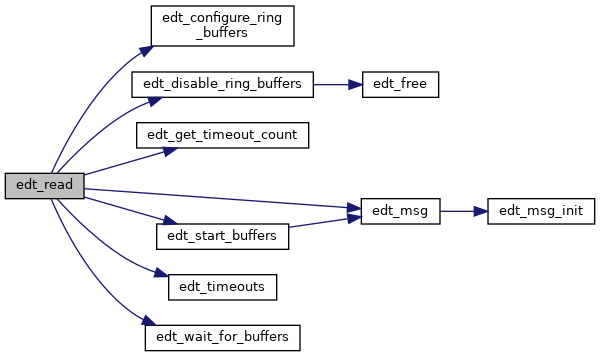
| int edt_write | ( | EdtDev | edt_p, |
| void * | buf, | ||
| uint_t | size | ||
| ) |
Perform a DMA write to the EDT device.
| edt_p | The open EDT device handle. |
| buf | Data to write to the device. |
| size | Number of bytes to write. buf must be equal to or greater than this size. |
For those on UNIX systems, the UNIX 2 GB file offset bug is avoided during large amounts of input or output. That is, reading past 2^31 bytes does not fail. This call is not multibuffering, and no transfer is active when it completes.
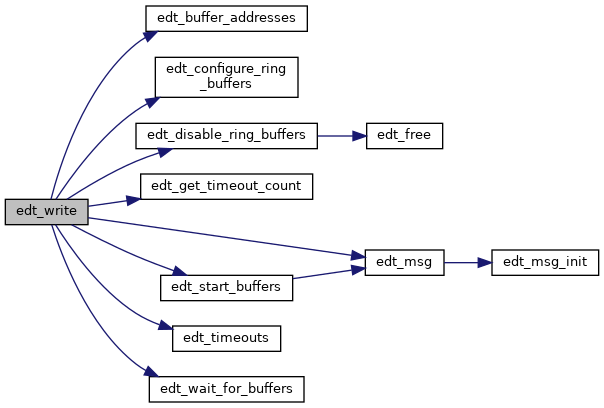
| int edt_configure_block_buffers | ( | EdtDev | edt_p, |
| int | bufsize, | ||
| int | numbufs, | ||
| int | write_flag, | ||
| int | header_size, | ||
| int | header_before | ||
| ) |
Prepare and configure ring buffers for DMA, allocating buffers as a single large block, setting the buffer addresses from within that block.
| edt_p | The open EDT device handle. |
| bufsize | Size of individual buffers, in bytes |
| numbufs | Number of buffers to create in the ring. |
| write_flag | Either EDT_WRITE or EDT_READ. |
| header_size | If non-zero, additional memory will be allocated for each buffer for Header data. The location of this header region is determined by the argument header_before. |
| header_before | If non-zero, the header region is placed before the DMA buffer. Otherwise it comes after the DMA buffer. |
This allows reading or writing buffers from/to a file in single chunks larger than the buffer size, which is sometimes considerable more efficient.
Primarily used by pdv_multibuf() in PDV library.
Buffer sizes are rounded up by PAGE_SIZE so that DMA occurs on a page boundary.
| void edt_set_dmy_wait_for_buffers_callback | ( | EdtDev | edt_p, |
| void(*)(struct edt_device *edt_p, void *buf) | callBack | ||
| ) |
Register a callback to populate the ring buffer with data when edt_wait_for_buffers() is called.
| edt_p | The EDT device handle, opened as a dummy device. |
| callback | Function to invoke when edt_wait_for_buffers() is called. |
When "dmy" or "DMY" is passed as the first argument to edt_open*(), the internal device ID (get with edt_device_id()() is set to DMY_ID and all attempted interaction with EDT hardware is ignored.
| void edt_set_dmy_reg_read_callback | ( | EdtDev | edt_p, |
| uint32_t(*)(EdtDev edt_p, uint32_t reg_desc) | callback | ||
| ) |
Register a callback to read a simulated register when edt_reg_read() is called.
| edt_p | The EDT device handle, opened as a dummy device. |
| callback | Function to invoke when edt_reg_read() is called. |
| void edt_set_dmy_reg_write_callback | ( | EdtDev | edt_p, |
| void(*)(EdtDev edt_p, uint32_t reg_desc, uint32_t reg_value) | callBack | ||
| ) |
Register a callback to write a simulated register when edt_reg_write() is called.
| edt_p | The EDT device handle, opened as a dummy device. |
| callback | Function to invoke when edt_reg_write() is called. |
| EDT_CHECK_RETURN void * edt_map_dmamem | ( | EdtDev | edt_p | ) |
Memory-map the entire DMA channel's ring of buffers.
| edt_p | The open EDT device handle. |
| int edt_disable_ring_buffers | ( | EdtDev | edt_p | ) |
Disable EDT device ring buffers. Pending DMA is cancelled and all data buffers are released.
| edt_p | The open EDT device handle. |


| int edt_get_numbufs | ( | EdtDev | edt_p | ) |
Get the number of buffers allocated even if by other process (for monitoring from a separate call to edt_open()).
| edt_p | The open EDT device handle. |
| int edt_reset_ring_buffers | ( | EdtDev | edt_p, |
| uint_t | bufnum | ||
| ) |
Stop any active DMA then set the ring buffer to restart on buffer bufnum.
| edt_p | The open EDT device handle. |
| bufnum | The index of the ring buffer at which to start the next DMA. A number larger than the number of buffers will set current done count to bufnum modulo the number of buffers. |


| int edt_abort_dma | ( | EdtDev | edt_p | ) |
Stop any active DMA then set the ring buffer to restart on the current buffer.
| edt_p | The open EDT device handle. |


| int edt_abort_current_dma | ( | EdtDev | edt_p | ) |
Stop any active DMA then set the ring buffer to restart on the next buffer.
| edt_p | The open EDT device handle. |

| int edt_stop_buffers | ( | EdtDev | edt_p | ) |
Stop DMA transfer after the current buffer has completed. Ring buffer mode remains active, and transfers may be resumed by calling edt_start_buffers().
| edt_p | The open EDT device handle. |

| int edt_start_buffers | ( | EdtDev | edt_p, |
| uint_t | count | ||
| ) |
Start DMA transfers for count number of buffers.
| edt_p | The open EDT device handle. |
| count | Number of buffers in a ring to release to the driver for transfer. A value of 0 starts "free running" mode where transfers run continuously until edt_stop_buffers() is called. If count is greater than the number of buffers in the ring, DMA continues looping through the buffers until the total count has been satisfied. |

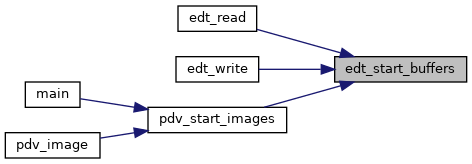
| int edt_set_buffer_size | ( | EdtDev | edt_p, |
| uint_t | index, | ||
| uint_t | size, | ||
| uint_t | write_flag | ||
| ) |
Change the size or direction of one buffer in a ring.
| edt_p | The open EDT device handle. |
| index | Index of ring buffer to change. |
| size | New buffer size to use. |
| write_flag | Direction; either EDT_WRITE or EDT_READ. |
Mixing directions requires detailed knowledge of the interface since pending preloaded DMA transfers need to be coordinated with the interface fifo direction. For example, a DMA write will complete when the data is in the output fifo, but the DMA read should not be started until the data is out to the external device. Most applications requiring fast mixed reads/writes have worked out more cleanly using seperate, simultaneous, read and write dma transfers using different DMA channels.


| unsigned int edt_allocated_size | ( | EdtDev | edt_p, |
| int | buffer_idx | ||
| ) |
Get the allocated size of the specified buffer.
| edt_p | The open EDT device handle. |
| buffer_idx | Index of the buffer. |
| int edt_get_total_bufsize | ( | EdtDev | edt_p, |
| int | bufsize, | ||
| int | header_size | ||
| ) |
Get the total buffer size for block of buffers, in which the memory allocation size is rounded up so all buffers start on a page boundary. This is used to allocate a single contiguous block of DMA buffers.
| edt_p | The open EDT device handle. |
| bufsize | Size of a buffer. |
| header_size | Optional size of an additional header region. |
| void * edt_wait_for_buffers | ( | EdtDev | edt_p, |
| int | count | ||
| ) |
Blocks until the specified number of buffers have completed.
| edt_p | The open EDT device handle. |
| count | Number of buffers to block for. Completed buffers are numbered relatively; start each call with 1. |

| int edt_get_timestamp | ( | EdtDev | edt_p, |
| edt_timespec_t * | ts, | ||
| u_int | bufnum | ||
| ) |
Get the seconds and nanoseconds timestamp of when DMA was completed on the buffer specified by bufnum.
| edt_p | The open EDT device handle. | |
| [out] | ts | Timestamp representing the system time at which the buffer completed. |
| bufnum | Either buffer index or, if greater than number of buffers in the ring, number of buffers completed. |
ts and returns 0. On failure, returns -1.Example:

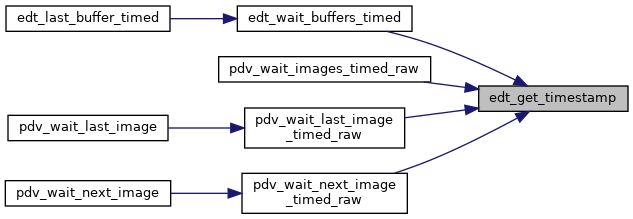
| void * edt_wait_for_next_buffer | ( | EdtDev | edt_p | ) |
Wait for the next buffer that finishes DMA. Depending on how often this routine is called, buffers that have already completed DMA might be skipped.
| edt_p | The open EDT device handle. |

| void * edt_last_buffer_timed | ( | EdtDev | edt_p, |
| edt_timespec_t * | ts | ||
| ) |
Like edt_last_buffer() but also returns the time at which the DMA was complete on this buffer.
| edt_p | The open EDT device handle. | |
| [out] | ts | Timestamp representing the system time at which the buffer completed. |
Example:

| void * edt_last_buffer | ( | EdtDev | edt_p | ) |
Wait for the last buffer that has been transferred. Useful if an application cannot keep up with buffer transfer. If this routine is called a second time before another buffer has been transferred, it will block waiting for the next transfer to complete.
| edt_p | The open EDT device handle. |

| void * edt_wait_buffers_timed | ( | EdtDev | edt_p, |
| int | count, | ||
| edt_timespec_t * | ts | ||
| ) |
Block until the specified number of buffers have completed.
| edt_p | The open EDT device handle. | |
| count | Number of buffers for which to block. Completed buffers are numbered cumulatively starting with 0 when the EDT device is opened. | |
| [out] | ts | Timestamp representing the system time at which the last buffer completed. |


| int edt_set_buffer | ( | EdtDev | edt_p, |
| uint_t | bufnum | ||
| ) |
Set which buffer should be started next. Usually done to recover after a timeout, interrupt, or error.
| edt_p | The open EDT device handle. |
| bufnum | The index of the buffer to start next. |
\Example

| void * edt_next_writebuf | ( | EdtDev | edt_p | ) |
Get a pointer to the next buffer scheduled for output DMA, in order to fill the buffer with data.
| edt_p | The open EDT device handle. |
| uint32_t edt_dma_buffers_done_waiting | ( | EdtDev | edt_p | ) |
Get the number of DMA buffers that have been waited for.
| edt_p | The open EDT device handle. |
This value is updated by edt_wait_for_buffers() or edt_wait_for_next_buffer(). It indicates the (total) number of buffers that have been "waited" on and successfully finished transferring.
| void ** edt_buffer_addresses | ( | EdtDev | edt_p | ) |
Get an array of ring buffer pointers.
| edt_p | The open EDT device handle. |
n-1 where n is the number of ring buffers set in edt_configure_ring_buffers(). 
| uint32_t edt_done_count | ( | EdtDev | edt_p | ) |
Returns the cumulative count of completed buffer transfers in ring buffer mode.
| edt_p | The open EDT device handle. |
Completed buffers are numbered consecutively starting with 0 when edt_configure_ring_buffers() is invoked. The index of the ring buffer most recently completed by the driver equals the number returned modulo the number of ring buffers.
If an error occurs, call edt_perror() to get the system error message.
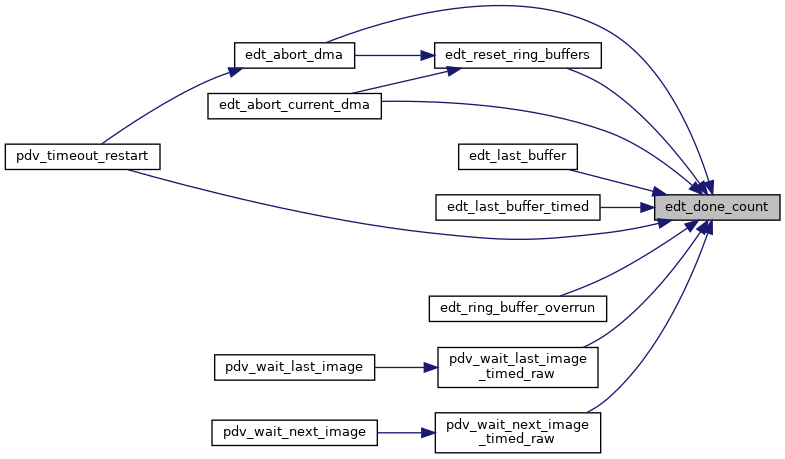
| void * edt_check_for_buffers | ( | EdtDev | edt_p, |
| uint_t | count | ||
| ) |
Checks, without blocking, if the specified number of buffers have completed.
| edt_p | The open EDT device handle. |
| count | Number of buffers. Must be 1 or greater. |
count if it has completed DMA, or NULL if count buffers are not yet complete.| uint16_t edt_get_direction | ( | EdtDev | edt_p | ) |
Get the value of the PCD_DIRA and PCD_DIRB registers. The value from PCD_DIRB is shifted up 8 bits.
| edt_p | The open EDT device handle. |

| void edt_startdma_reg | ( | EdtDev | edt_p, |
| uint_t | desc, | ||
| uint_t | val | ||
| ) |
Set the register and value to use at the start of DMA, as set by edt_startdma_action().
| edt_p | The open EDT device handle. |
| desc | Register description of which register to use as in edtreg.h. |
| val | Value to write to register described by desc. |
| void edt_enddma_reg | ( | EdtDev | edt_p, |
| uint_t | desc, | ||
| uint_t | val | ||
| ) |
Sets the register and value to use at the end of dma, as set by edt_enddma_action().
| edt_p | The open EDT device handle. |
| desc | Register description of which register to use as in edtreg.h. |
| val | Value to write to register described by desc. |
| void edt_startdma_action | ( | EdtDev | edt_p, |
| uint_t | val | ||
| ) |
Specifies when to perform the action at the start of a DMA transfer as specified by edt_startdma_reg().
| edt_p | The open EDT device handle. |
| val | One of EDT_ACT_NEVER, EDT_ACT_ONCE, or EDT_ACT_ALWAYS. |
A common use of this is to write a register which signals an external device that DMA has started, to trigger the device to start sending. The default is no DMA action.
The PDV library uses this function to send a trigger to a camera at the start of DMA. This function allows the register write to occur in a critical section with the start of DMA and at the same time.
Example:
| void edt_enddma_action | ( | EdtDev | edt_p, |
| uint_t | val | ||
| ) |
Specifies when to perform the action at the end of a DMA transfer as specified by edt_enddma_reg().
| edt_p | The open EDT device handle. |
| val | One of EDT_ACT_NEVER, EDT_ACT_ONCE, or EDT_ACT_ALWAYS. |
A common use of this is to write to a register which signals an external device that DMA is complete, or to change the state of a signal which will be changed at the start of DMA, so the external device can look for an edge. The default is no end of DMA action.
Most applications can set the output signal, if needed, from the application with edt_reg_write(). This routine is only needed if the action must happen within microseconds of the end of DMA.
Example:
| int edt_do_timeout | ( | EdtDev | edt_p | ) |
Cause the driver to perform the same actions as it would on a timeout. Partially filled FIFOs will be flushed and DMA will be aborted.
| edt_p | The open EDT device handle. |
Used when the application has knowledge that no more data will be sent/accepted. Used when a common timeout cannot be known, such as when acquiring (image) data from a telescope CCD array where the amount of data sent depends on unknown future celestial events. Also used by the library when the operating system can not otherwise wait for an interrupt and timeout at the same time.
| int edt_timeouts | ( | EdtDev | edt_p | ) |
Get the number of read and write timeouts that have occurred since the last call of edt_open().
| edt_p | The open EDT device handle. |
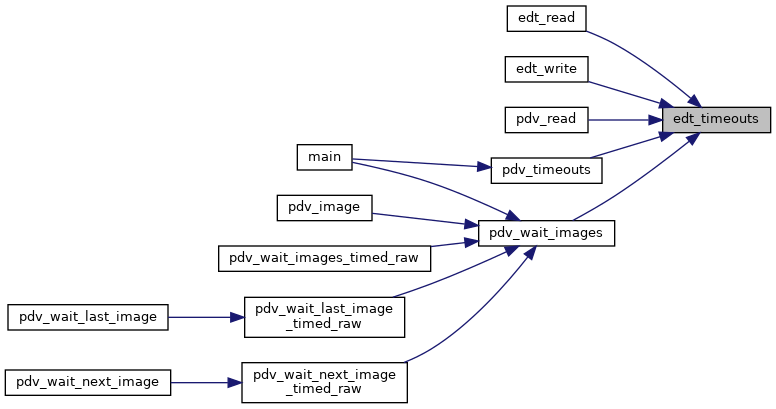
| uint_t edt_get_timeout_count | ( | EdtDev | edt_p | ) |
Get the number of bytes transferred at last timeout.
| edt_p | The open EDT device handle. |

| int edt_set_timeout_action | ( | EdtDev | edt_p, |
| EdtDmaTimeoutAction | action | ||
| ) |
Set the driver behavior on a timeout.
| edt_p | The open EDT device handle. |
| action | The action to perform when a timeout occurs. Values documented in EdtDmaTimeoutAction. |

| int edt_get_timeout_goodbits | ( | EdtDev | edt_p | ) |
Get the number of good bits in the last long word of a read buffer after the last timeout. This routine is called after a timeout if the timeout action is set to EDT_TIMEOUT_BIT_STROBE.
| edt_p | The open EDT device handle. |
| int edt_get_goodbits | ( | EdtDev | edt_p | ) |
Get the current number of good bits in the last long word of a read buffer (0 through 31).
| edt_p | The open EDT device handle. |
| int edt_set_event_func | ( | EdtDev | edt_p, |
| enum edt_kernel_event | event_type, | ||
| EdtEventFunc | func, | ||
| void * | data, | ||
| int | continuous | ||
| ) |
Define a function to call when an event occurs.
Use this routine to send an application-specific function when required; for example, when DMA completes, allowing the application to continue executing until the event of interest occurs.
If you wish to receive notification of one event only, and then disable further event notification, send a final argument of 0 (see the continue parameter described below). This disables event notification at the time of the callback to your function.
| edt_p | The open EDT device handle. |
| event_type | The event that causes the function to be called. |
| func | The function to call when the event occurs. |
| data | Data to pass to the func function; usually edt_p. |
| continuous | Flag to enable or disable continued event notification. A value of 0 causes edt_remove_event_func() to be called as the event is triggered. |
| int edt_remove_event_func | ( | EdtDev | edt_p, |
| enum edt_kernel_event | event_type | ||
| ) |
Remove an event function previously set with edt_set_event_func().
| edt_p | The open EDT device handle. |
| event_type | The event that causes the function to be called. Valid events are listed in edt_set_event_func(). |
| int edt_ring_buffer_overrun | ( | EdtDev | edt_p | ) |
Determine if DMA has written to more buffers in the ring than user space code has "waited" (edt_wait_for_buffers()) for. Indicates user space code cannot keep up with the DMA transfer rate.
| edt_p | The open EDT device handle. |

| int edt_set_burst_enable | ( | EdtDev | edt_p, |
| int | onoff | ||
| ) |
Set the burst enable flag, determining whether the DMA master transfers as many words as possible at once, or transfers them one at a time as soon as the data is acquired.
| edt_p | The open EDT device handle. |
| enable | A value of 1 turns the flag on (the default); 0 turns it off. |
Burst transfers are enabled by default to optimize use of the bus; however, you may wish to disable them if data latency is an issue, or for diagnosing DMA problems.
| int edt_get_burst_enable | ( | EdtDev | edt_p | ) |
Get the value of the burst enable flag.
| edt_p | The open EDT device handle. |
| 1 | if burst transfers are enabled |
| 0 | if disabled |
| -1 | on error |
| int edt_set_rtimeout | ( | EdtDev | edt_p, |
| int | timeout_ms | ||
| ) |
Set the timeout for data receive calls.
Affects edt_wait_for_buffers() and edt_read().
| edt_p | The open EDT device handle. |
| timeout_ms | Milliseconds to wait before timing out. A value of 0 disables the timeout, causing read calls to wait forever (blocking). |

| int edt_set_wtimeout | ( | EdtDev | edt_p, |
| int | timeout_ms | ||
| ) |
Set the timeout for data transmit calls.
Affects edt_wait_for_buffers() and edt_write().
| edt_p | The open EDT device handle. |
| timeout_ms | Milliseconds to wait before timing out. A value of 0 disables the timeout, causing write calls to wait forever (blocking). |

| int edt_get_rtimeout | ( | EdtDev | edt_p | ) |
Gets the current read timeout value: the number of milliseconds to wait for DMA reads to complete before returning.
| edt_p | The open EDT device handle. |

| int edt_get_wtimeout | ( | EdtDev | edt_p | ) |
Gets the current write timeout value: the number of milliseconds to wait for DMA reads to complete before returning.
| edt_p | The open EDT device handle. |
| uint_t edt_overflow | ( | EdtDev | edt_p | ) |
Get DMA overflow counter from the driver. Reset by edt_reset_counts().
| edt_p | The open EDT device handle. |
| >=0 | Overflow count read from the driver. |
| -1 | Error occurred. |